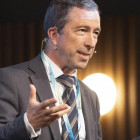Learning Cafés
Challenges Are the Start of Great Solutions: Challenge Based Learning in Action!
Date Thursday, Dec 2 Time – Room: Köpenick I&II
Everyone interested in using Challenge Based Learning to solve authentic societal challenges is welcome in this interactive Learning Café.
A transdisciplinary team of experienced CBL educators will briefly share different Challenge-Based Learning models (e.g. design thinking, action research, CBL challenge framework) to get everyone on the same page.
Then we dive into the action, dividing the participants into teams (resembling a true CBL situation), after which the participants will get access to CBL instruments that support setting up a CBL process either at your own university or in your own courses.
The group work is guided by four experienced CBL coaches from renowned universities (Utrecht University, University Medical Centre Utrecht from the Alliance network and Universitat Politècnica de Catalunya from the EIT InnoEnergy network).
After this session you will know how and where to start CBL, get pointers for collaborating with stakeholders, have ideas on quality assurance & continuity so that your students acquire the right skills to master future innovation challenges.
Outcomes:
After this session you will know how and where to start CBL, get pointers for collaborating with stakeholders, have ideas on quality assurance & continuity so that your students acquire the right skills to master future innovation challenges.
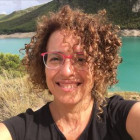
Gemma Tejedor Papell
Researcher, Universitat Politècnica De Catalunya
Gemma Tejedor holds a PhD in Sustainability from the Universitat Politècnica de Catalunya (UPC), focusing, as well as her research, on transdisciplinary learning for sustainability within engineering education. She holds a master's degree in Sustainability from the UPC and a degree in Forestry Engineering from the University of Lleida. She works at the Institute of Research in Science and Technology for Sustainability of the UPC (ISST) in sustainability education projects. She teaches sustainability at undergraduate level, and transdisciplinarity at master level at UPC. She worked as forestry engineer for 17 years and in several cooperation projects in Latin America.
Links
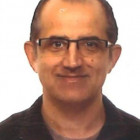
Jordi Segalàs
Director Research Institute for Sustainability Science and Technology, Universitat Politècnica de Catalunya. Barcelona Tech
Jordi Segalàs (1967) is the Director of the Research Institute of Sustainability Science and Technology at UPC-Barcelona Tech University. He is the head of the Research Group on Sustainability Education and Technology in Higher Education. He is the chair of the Sustainability working group of the European Society for Engineering Education. He has been working in curriculum greening policies and actions plans since 2000. He is also working in Erasmus + Capacity Building and knowledge Alliances projects related to sustainable development in higher education. He has published more than 150 articles on sustainability in higher education and has more than 15 years’ experience in teaching sustainability courses in technological universities. More information about Jordi Segalàs research: http://futur.upc.edu/JordiSegalasCoral.
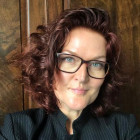
Michèle Gerbrands
Educational innovator and advisor, University Medical Center Utrecht
After studying Computer Science and Media Innovation, she passionately spent the last twenty years working in higher education and health care as a lecturer, innovator, coach, workshop moderator, community leader, online content developer and project leader. She is driven by her passion to engage students in developing transdisciplinary skills to prepare them in becoming the future global complex problem solvers. For this, she introduced the Challenge-Based Learning (CBL) concept seven years ago. She is currently working for the Dutch strategic alliance (www.ewuu.nl) and Biomedical Sciences department where she co-develops pilots to translate her vision on educational innovations towards a sustainable academic CBL landscape.
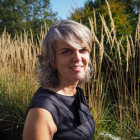
Sabine Uijl
Project leader Innovative Educational concepts, UTRECHT UNIVERSITY, Netherlands
Sabine Uijl is programme manager ‘U-Collaborate in Education’ for Utrecht University and project leader for the Dutch strategic alliance of Eindhoven University of Technology, Wageningen University & Research, Utrecht University and University Medical Centre Utrecht. As project leader, her main projects are ‘Innovative didactic concepts’, focussed on challenge-based learning, ‘Flexible innovative programmes’ and ‘Research of educational innovation’. Her presentation experience over the course of her academic career has a wide range, and vary from conference presentations and teaching and leading workshops, to webinars and podcasts.
As epidemiologist and social scientist Sabine is familiar with the chances and challenges of transdisciplinarity in research and education. Due to her experience as education manager/ director and education innovator, she knows the developments in higher education and continues to contribute to these.
Moderator

Inge de Waard
Sr. Learning Strategist & hopeful explorer, EIT InnoEnergy, Belgium
Inge is a senior learning strategist, long-time researcher, award-winning learning innovator and (e)Learning coordinator. She developed multiple online and hybrid courses, she coaches and co-creates international, blended curricula with engineers and teachers, and explores new, innovative learning formats. Her expertise has been recognised by peers, resulting in additional co-authored papers, invited talks and keynotes in both academic as well as professional conferences, workshops and seminars. But most of all, she likes to connect, listen and share stories.
Her latest project is twofold and involve AI in Education (https://skillcharge.innoenergy.com/), as well as reskilling and learning above 50 (https://www.secretshakers.com). These two projects fit within the goal of providing a more tailored, lifelong learning journey to employees of all ages. In the AI project, Inge oversees the learning aspect of SkillCharge, a skill project launched by EIT InnoEnergy. This project combines AI, HR and Learning to match courses to skill gaps that individuals. In the Secret Shakers project, Inge researches what makes new projects started by people aged 50+ be successful, and how do these people reskill themselves. This project is a response to the societal view on employees over 50 and their capacities to learn and thrive in new, innovative environments.
